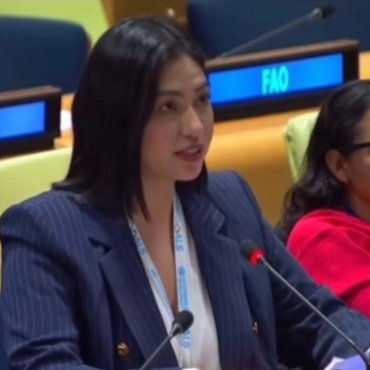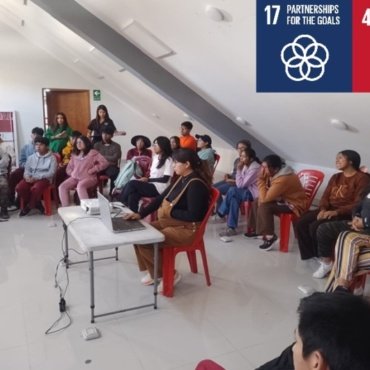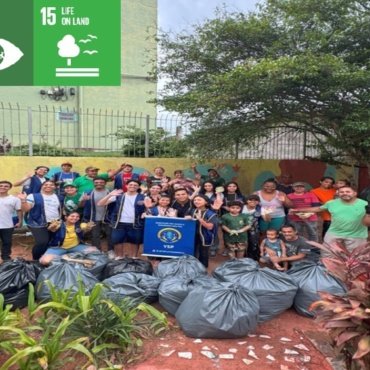International Conference for the Launching of YSP Asia and Pacific Region #Thailand

The Government of the Kingdom of Thailand provided unwavering support for the launching of the Youth and Students for Peace (YSP) by sending two Cabinet Ministers and officially co-hosting the program.
YSP is a global network of young people dedicated to building a world of lasting peace and mutual prosperity by living for others, creating families of true love, and contributing to society. It builds on the values of filial piety, supports inter-generational families and cultivates a sense of social responsibility.
The event on June 12, was carried out at the United Nations Conference Centre, ESCAP Hall in Bangkok, Thailand; which seats nearly one thousand two hundred people. The guests throughout the day included approximately eight hundred international guests coming from thirty-five nations, with more than nine hundred guests from Thailand – making for a total of one thousand seven hundred forty-five participants. The theme was, “The Role of Youth and Students in Creating a Culture of Sustainable Peace.”
ESCAP stands for the Economic and Social Commission for Asia and the Pacific.
The Chief Guest and conference host was Dr. Teerakiat Jareonsettasin, MD., Minister of Education, from Thailand. The keynote address was given by Dr. Sun Jin Moon, International Chair of the Universal Peace Federation, who spoke on behalf of her mother and YSP Founder, Dr. Hak Ja Han Moon.
Dr. Teerakiat Jareonsettasin spoke in English and said, “The end goal of education must be character, nothing less. And the key to achieve character is only through love.” He went on to explain that love in the cognitive realm becomes truth; in the realm of action it becomes right conduct; and manifested in feelings, love becomes peace.
The Honorable Minister continued saying, “I am very pleased that your movement, your programs, tap into the foundation of character that is love. Therefore, the Thai government will continue to support all activities, from any movement in fact, that promotes the spreading of love because when love manifests as understanding then nonviolence is there automatically.”
Dr. Sun Jin Moon, a graduate from Harvard University, encouraged young people to achieve distinction in their career choices and especially to cultivate universal virtues and values. She said, “In addition to the acquisition of the skills required for excellence in a career, it is also equally important, if not more important, that we develop our moral character by cultivating virtues such as empathy, and living for the sake of others.”
Holding back her tears Dr. Moon continued, “Thus, my parents placed family at the core of their global vision of peace. In fact, it is by building families of true love, raising children of good character, guided by the principle of living for the sake of world peace that we contribute to sustainable peace.”
Dr. Robert Kittel, the newly appointed YSP International President, highlighted the four loves that are learned in the family: 1) Parents’ love for their children called parental love; 2) Children’s love for their parents called filial piety; 3) Siblings’ love where brothers and sisters love each other; and 4) Conjugal love between husband and wife. He then stressed the role youth and students play in creating a culture of sustainable peace, saying, “Of these four loves, it is the role of youth and students to take responsibility for two loves: filial piety and siblings’ love.”
Other speakers at the inaugural session included Gen. Terdsak Marrome, President, UPF Thailand; who paid tribute to Thailand’s late Monarch, HRH King Bhumibol Adulyadej, and offered welcoming remarks.
Hon. Akila Viraj Kariyawasam, Minister of Education from Sri Lanka, began by noting that seventy-five percent of the global youth population live in developing countries. He emphasized that, “To inculcate a communal responsibility among all our people and share a best-practice in Sri Lanka where they developed an effective vehicle for the youth to express their views through the institution called Youth Parliament”, consisting of two hundred twenty-five elected youth representatives to foster democratic ideals.
Hon. Dr. Pen Pannha, MP, Member of the Permanent Committee and President of the Commission on Legislation and Justice of the Cambodian National Assembly, reminded everyone that, “Ending wars is an enormous and difficult task for us all. But maintaining and ensuring peace – particularly strengthening the culture of peace – is a duty to be fulfilled before we achieve complete sustainable development.”
SESSION II:
The Principles of Sustainability and the Responsibility of Youth in Nation Building
This session first sought to identify the basic principles of sustainability. In essence, it pursued a common understanding of the meaning of being good, which is in harmony with the world’s great religious teachings. The concept is simple; it is live for the sake of others. This was the motto that Father Moon adopted throughout his life. Having a universal definition of goodness helped lay the foundation for appreciating the role and responsibility of youth in nation building.
SESSION III:
Preparing for a Successful Future: The Importance of Marriage and Family
This session discussed the importance of marriage and family for both public and private wellbeing. These institutions are associated with a wide range of emotional, economic, health, educational, and safety benefits that help local, state, and federal governments serve the common good. Speakers appreciated Father and Mother Moon’s initiative of building world peace through reviving marriage and family.
SESSION IV:
Symposium: Responsibility of Youth to Build a Culture of Peace
Two of the youngest Members of Parliament in their respective countries – a beauty queen, a government official representing his Ministry, and two National Directors for youth ministries affiliated with the sponsoring organizers – made for a powerful and exciting closing symposium. It was lively, interactive and educational. One of the key concepts was that peace cannot come through means of force. We need to create a good culture in order for peace to blossom. In other terms, everyone participates in peace building; it is not a spectator sport.




